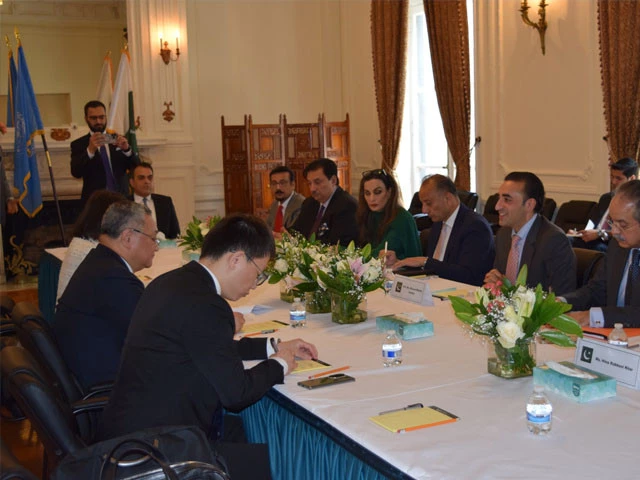Bilawal slams India's 'weaponisation of water' in UN talks
Pakistani delegation meets Chinese and Russian envoys to UN, E10 ambassadors to highlight India’s aggression

Pakistan People’s Party (PPP) Chairman Bilawal Bhutto Zardari, leading a high-level delegation, met with Ambassador Fu Cong, the Permanent Representative of China to the United Nations, to discuss the evolving security situation in South Asia, particularly in the wake of India’s recent aggressive actions.
The meeting on Monday focused on Pakistan’s efforts to maintain peace and stability in the region amidst India’s belligerent posture. Bilawal expressed heartfelt gratitude from the people of Pakistan for China’s unwavering support during India’s provocations.
He briefed the Chinese delegation on the developments following the April 22 Pahalgam attack, highlighting Pakistan’s responsible and restrained response in contrast to India’s aggressive actions.
"It is regrettable that India rejected Pakistan’s offer for an independent, impartial, and transparent investigation," Bilawal said.
پاکستان اور چین کا جنوبی ایشیا میں ذمہ دارانہ امن کے فروغ اور کثیر الجہتی تعاون پر زور
— PTV News (@PTVNewsOfficial) June 2, 2025
اقوام متحدہ، 2 جون 2025 — اقوام متحدہ میں عوامی جمہوریہ چین کے مستقل مندوب، سفیر فو کانگ، نے پاکستان پیپلز پارٹی کے چیئرمین اور سابق وزیر خارجہ جناب بلاول بھٹو زرداری کی سربراہی میں اقوام… pic.twitter.com/2kNHdTTT9Z
He reiterated that the resolution of the Jammu and Kashmir dispute is crucial for lasting peace in South Asia and urged China to play an active role in resolving the issue through multilateral cooperation, in line with United Nations Security Council resolutions.
The delegation also shared details of India’s arbitrary attacks on Pakistani territory, the deliberate targeting of civilians, its involvement in funding and supporting terrorism in Pakistan, and the provocative suspension of the Indus Waters Treaty — a move Bilawal described as the "weaponisation of water" and a clear violation of international law.
Both Pakistan and China agreed that unilateral and aggressive actions pose a serious threat to regional peace and must be firmly opposed.
Pakistan’s Delegation in a meeting with China’s PR to the UN, Amb. Fu Cong, shared our post war perspective. I condemned India’s reckless actions, including its weaponization of water, and reaffirmed that IIOJK remains an unresolved dispute and a fault line for regional peace.…
— BilawalBhuttoZardari (@BBhuttoZardari) June 2, 2025
The two sides reaffirmed their commitment to resolving disputes peacefully, adhering to the principles of the UN Charter, respecting international law, and preserving the sanctity of treaties.
Bilawal expressed his thoughts on social media after the talks, stating, "I condemned India’s reckless actions, including its weaponisation of water, and reaffirmed that IIOJK remains an unresolved dispute and a fault line for regional peace.
He reiterated Pakistan’s commitment to the ceasefire, regional stability, and a peaceful resolution in accordance with the UN Charter. The international community must reject India’s dangerous “new normal” of aggression."
Together with Pakistan delegation met with the Permanent Representative of the Russian Federation to the UN to convey Pakistan’s principled stance in the wake of India’s unprovoked aggression. Highlighted Pakistan’s responsible and measured approach, and underscored the… pic.twitter.com/ZOwVFE4U43
— BilawalBhuttoZardari (@BBhuttoZardari) June 2, 2025
Later, the Pakistani delegation met with the Permanent Representative of the Russian Federation to the United Nations and conveyed Pakistan’s principled stance in the wake of India’s unprovoked aggression.
Bilawal highlighted Pakistan’s responsible and measured approach and underscored the imperative of a lasting ceasefire, while also drawing attention to India’s dangerous weaponisation of water.
He further reiterated Pakistan’s call for comprehensive dialogue to resolve the Jammu and Kashmir dispute in accordance with UN Security Council resolutions.
Bilawal urged Russia to support efforts for regional stability and a rules-based international order anchored in the UN Charter.
Held a substantive exchange together with Pakistan Delegation with Ambassadors of the UN Security Council’s elected members (E10), conveying Pakistan’s principled and responsible stance in the face of India’s escalating provocations. Reaffirmed our abiding commitment to… pic.twitter.com/6wd8l1igwl
— BilawalBhuttoZardari (@BBhuttoZardari) June 2, 2025
The Pakistani delegation also held a substantive exchange with ambassadors of the UN Security Council’s elected members (E10).
During the meeting, Bilawal conveyed Pakistan’s principled and responsible stance in the face of India’s escalating provocations. He reaffirmed Pakistan’s abiding commitment to restraint, diplomacy, dialogue, and a rules-based international order.
He further underscored the dangers posed by India’s weaponisation of water in violation of the Indus Waters Treaty, and reiterated the need to resolve the Jammu and Kashmir dispute in line with Security Council resolutions.
"Pakistan unequivocally condemns terrorism in all its forms and manifestations, and remains a victim of terrorism that is planned and sponsored from beyond its borders. While Pakistan does not seek conflict, it stands fully prepared to defend its sovereignty and territorial integrity. South Asia cannot afford another crisis," said Bilawal.























COMMENTS (2)
Comments are moderated and generally will be posted if they are on-topic and not abusive.
For more information, please see our Comments FAQ